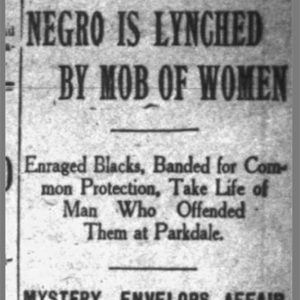calsfoundation@cals.org
Ernest Williams (Reported Lynching of)
On June 21, 1908, the Arkansas Gazette reported that an African-American man named Ernest Williams was lynched at Parkdale (Ashley County) by a group of Black women. The report, if true, would be a unique event, with female-led mobs being rare to nonexistent, especially among African Americans lynching a fellow Black person. However, there are reasons to believe that this report was false and, instead, part of a larger pattern of slandering local emancipation celebrations.
The report in the Gazette is datelined June 20 from Hamburg (Ashley County) and relays the following information: “A mob of enraged negro women dragged Ernest Williams, negro, to a telegraph pole on the outskirts of Parkdale, a town in this county, and lynched him one night recently, according to a report received here today.” As background, the Gazette stated that Black women of the community had organized “a league to enforce better moral conduct by their race, and to protect themselves from negro men.” Williams allegedly offended local sensibilities by using “profane and objectionable language in the presence of some of the women in this reported league.”
The Gazette, however, noted that the entire affair was shrouded in mystery. Although it could not give the exact date of the lynching, it did somehow report that the event occurred between 8:00 p.m. and 9:00 p.m. and that Williams’s body was not discovered until the following day, and that he had specifically been hanged from a telegraph pole “with a grass rope.” By the time the Gazette went to press with the story, “no investigation had been conducted” by the town marshal, but apparently the matter was to be brought before a grand jury soon. The report ends thusly: “This is probably the first instance in the history of the state where a man has been lynched by a mob of women, if the report from Parkdale is accurate.”
However, there are reasons to disbelieve the narrative offered in the Arkansas Gazette. First, despite the singular nature of this event, something that would certainly be newsworthy and of interest to readers, the Gazette published no follow-up story in subsequent issues, and only a handful of national papers picked up on the story. Second, many newspapers liked to report rumors of Black criminality that coincided with the June 19 celebration of Emancipation Day, now more commonly known as Juneteenth. For example, the Nashville News of Howard County reported on June 23, 1906, the following: “The negroes who went from Nashville on the excursion to Stamps, to attend the celebration of Emancipation Day, returned to this city Tuesday night with wild rumors of killings at the place, the number of people killed being reported variously from one to seven.” The celebration of Emancipation Day is not referenced in the Gazette’s reporting, but the timing is suspect, especially for so vague a report.
The Gazette’s single report gives no biographical information that might aid in identifying the putative victim, who was described as a resident of Parkdale. There were two individuals named Earnest Williams living in Ashley County by the time of the 1900 Census, but they would both have been children at the time of the lynching. Unfortunately, the Gazette report, contrary to practice at the time of presenting some approximation of the age of the lynching victim, omitted all biographical information beyond his name and residency, making it exceedingly difficult to determine which, if any, of the many people with the exact or similar name on the census may have been the victim.
For additional information:
“Negro Is Lynched by Mob of Women.” Arkansas Gazette, June 21, 1908, p. 1.
Staff of the CALS Encyclopedia of Arkansas
 Civil Rights and Social Change
Civil Rights and Social Change Early Twentieth Century, 1901 through 1940
Early Twentieth Century, 1901 through 1940 Ernest Williams Lynching Article
Ernest Williams Lynching Article 




Comments
No comments on this entry yet.